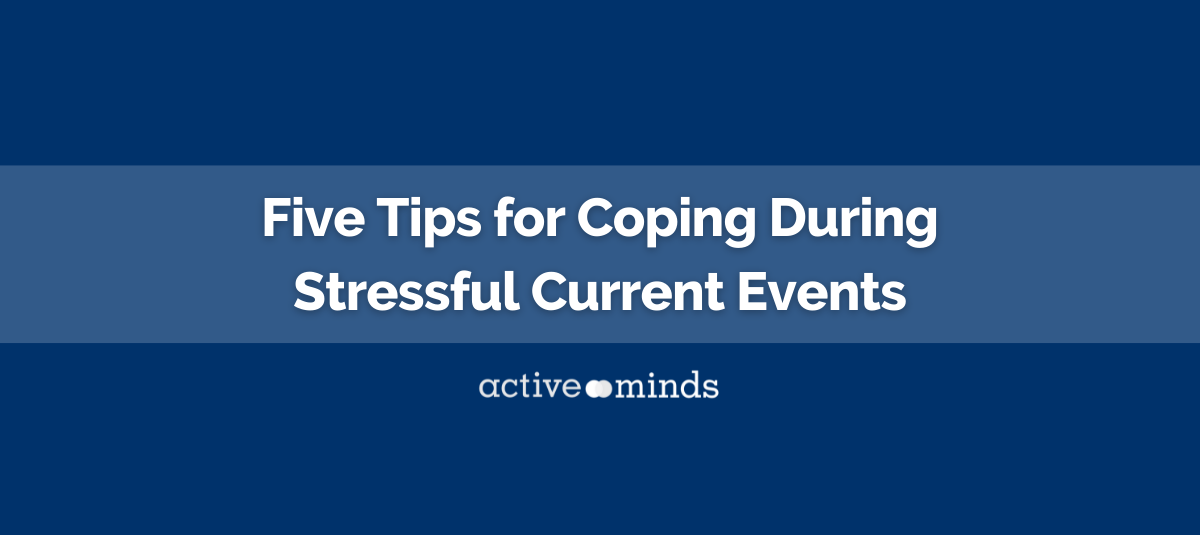Doomscrolling: the tendency to continue to surf or scroll through bad news, even though that news is saddening, disheartening, or depressing. Throughout the COVID-19 pandemic, there was likely at least one time you recognized yourself getting deeper and deeper into scary or upsetting news, but were unable to pull yourself away. That makes sense – current events can have tangible effects on us. Throughout the past week, this may feel especially true. The Supreme Court handed down several decisions that will have a major impact on abortion rights, climate change, tribal sovereignty, gun control, and much more. It can be easy to feel caught up in all the breaking news – so the question becomes, what can we do when we feel powerless?
The first thing to know is that it’s okay to feel affected by what you see in the news. Whether it’s empathy kicking in, a fear of what or who may be targeted next, or your own rights being threatened, it’s normal to notice an impact on your mental health during stressful current events. Many of us have felt it, and have been reflecting on how we can not only help those around us but also take care of our own mental health. To help you get started, we’ve come up with five tips that we hope will help you cope with feelings of stress or sadness surrounding today’s politics and current events:
- Remember that you are allowed (and encouraged) to take a break from consuming media: Back to the topic of doomscrolling. While it’s of course helpful to stay informed about what’s happening, especially when it’s occurring at a level such as the Supreme Court, there comes a point where you’re no longer actively absorbing helpful information, and instead are passively filling your mind with more worries. If you start to notice your heart rate rising, your breath quickening, or your thoughts feeling unmanageable, put down your phone, turn off the TV, and take a break. Do something that engages all of your senses, like taking a walk. The news will still be there when you return.
- Talk to those around you about how you’re feeling: The toll that disheartening news can have on you is real. Be open with those around you about your feelings, and let them know that you may need time to process, or that you need help working through what you’re feeling. This can include your friends, partner, parents, or even your boss. They may not be feeling affected in the same way – that doesn’t make your experience any less valid. You deserve to take care of yourself and to have people around you who support you.
- Look for ways to channel your emotions into action: When you’re feeling hopeless, scared, or nervous, one thing that can help is channeling that energy into actionable steps you can take to help the situation causing those feelings. Look for local organizations that you can support financially, volunteer for, or offer resources to. Additionally, you can take steps independently, such as starting a fundraiser, taking time to properly educate yourself on the topics being discussed, or reaching out to your network to see if there’s anyone you could support.
- Consider seeking professional help if you are consistently feeling anxious, depressed, or have thoughts of harming yourself: There is no shame in seeking support, nor is there ever a wrong reason to seek help. You may be feeling more affected than you anticipated, and that’s okay. If you’re a student, consider reaching out to your school’s counseling office. For those in the workplace, talk to your management and see what support systems are available. You can also reach out to a crisis helpline, more information about which can be found here.
- Know that it’s okay to not be okay: All of these tips come back to one major theme: it’s okay to not be okay right now. It’s okay to be scared, unsure, nervous, hopeless, or any combination of emotions. Your feelings are valid, but they are not you. You will get through this, and you will feel okay again. Lean on those around you, take action when possible, and seek professional help if necessary.




